Discover Oriental hiking, an innovative concept!
Soraya SHANTI, instigator and organizer tells us about this original event. Dancer, Bellydance teacher but also PhD student in Maghrebi-Oriental dances in France, she shares her experience and cultural background both unusual and exciting.
This Oriental hiking concept is unique, how did you come up with the idea and what are your objectives?
 This idea comes from my passion for nature, hiking, and outdoor bellydancing but also from the desire to build bridges between cultures. I regularly try out outdoor dance sessions with nature as the only sounds. My photo shoots are done like this as well. Since I don’t see myself as a model but a dancer, it helps me to let go while we shoot. Being isolated in the middle of nature allows my mind to escape, to go beyond its comfort zone.
This idea comes from my passion for nature, hiking, and outdoor bellydancing but also from the desire to build bridges between cultures. I regularly try out outdoor dance sessions with nature as the only sounds. My photo shoots are done like this as well. Since I don’t see myself as a model but a dancer, it helps me to let go while we shoot. Being isolated in the middle of nature allows my mind to escape, to go beyond its comfort zone.  We leave the dance studio, the mirror. No judgment, we do not see oneself and we know we’re somewhere else. It’s an ideal combination that can help us to really refocus on ourselves and our gestural feelings.
We leave the dance studio, the mirror. No judgment, we do not see oneself and we know we’re somewhere else. It’s an ideal combination that can help us to really refocus on ourselves and our gestural feelings.
I want to insist on the fact that Oriental hiking is also an associative event. With our team we chose to make this day accessible to the greatest number and be a time where the passionate ones can also learn while having a good time. Being a PhD student in sociology in Maghrebi-Oriental dances, it matters to me to share and have access to reliable scientific knowledge. Therefore we created the Artistic and Research Center for Maghrebi-Oriental Arts (association organizing this event) with this in mind. We are currently working on how to share this knowledge with dancers or to a greater extent (music, visual arts, literature...).A project with several conferences is taking shape for 2020.
Being a PhD student in sociology in Maghrebi-Oriental dances, it matters to me to share and have access to reliable scientific knowledge. Therefore we created the Artistic and Research Center for Maghrebi-Oriental Arts (association organizing this event) with this in mind. We are currently working on how to share this knowledge with dancers or to a greater extent (music, visual arts, literature...).A project with several conferences is taking shape for 2020.  It is not because we practice this discipline that we do not sometimes spread false information or stereotypes. Moreover the way these dances were introduced in France has somewhat frozen the imaginary around these and the way they are staged. It is the same for other performing arts, but we are mainly focusing on Oriental dances and music.
It is not because we practice this discipline that we do not sometimes spread false information or stereotypes. Moreover the way these dances were introduced in France has somewhat frozen the imaginary around these and the way they are staged. It is the same for other performing arts, but we are mainly focusing on Oriental dances and music.
What is the detailed program of this year's activities?
 The day begins with a hike in the middle of the valley of Munster in Alsace; a place hilly, green, and rejuvenating by its calm. Then an area waits for us to start an outdoor bellydance workshop, the floor is obviously not the one of a dance studio, the outside makes us return to a pure, simple, and spontaneous dance. No twirl, arabesque, or movement. We go back to a dance focusing mainly on the gestures characterizing Bellydance.
The day begins with a hike in the middle of the valley of Munster in Alsace; a place hilly, green, and rejuvenating by its calm. Then an area waits for us to start an outdoor bellydance workshop, the floor is obviously not the one of a dance studio, the outside makes us return to a pure, simple, and spontaneous dance. No twirl, arabesque, or movement. We go back to a dance focusing mainly on the gestures characterizing Bellydance.  Last year the theme was anchored dance, we will continue this year adding the arms gestures which are now the source of my dance.
Last year the theme was anchored dance, we will continue this year adding the arms gestures which are now the source of my dance.
An "open library" will be organized where you’ll be able to check academic readings about music and dances of Maghreb and the Middle East.
After there’ll be an exchange between the participants to compare our reflections and points of view.
The evening will end with a festive meal during which the bellydance in a folk way will find all its meaning. Spontaneity and simplicity are the hallmarks of this day.
You’re a PhD student in Maghrebi-Oriental dances in France, to what extent do you associate this cultural baggage with your teaching of Oriental dance?
 My research in sociology greatly influences my dance, as I continually question and critically examine the practices I observe and therefore also indirectly mine. By doing research I was able very quickly to locate and understand things that could bother me; especially the construction of sometimes discrediting speeches regarding this discipline and its dancers. Since 2016, I’ve organized a conference entitled "Imaginary and Oriental Dance: tools to locate, understand, and deconstruct stigmatizing assignments?".
My research in sociology greatly influences my dance, as I continually question and critically examine the practices I observe and therefore also indirectly mine. By doing research I was able very quickly to locate and understand things that could bother me; especially the construction of sometimes discrediting speeches regarding this discipline and its dancers. Since 2016, I’ve organized a conference entitled "Imaginary and Oriental Dance: tools to locate, understand, and deconstruct stigmatizing assignments?". Looking back, I notice the difference between what I produced 5 years ago and today. I’d say that I went back to my desire not to compromise on the importance of the meaning we give to dance. I draw on my story and experiences to offer artistic creations aiming to question, denounce, think about various subjects which affect me.
Looking back, I notice the difference between what I produced 5 years ago and today. I’d say that I went back to my desire not to compromise on the importance of the meaning we give to dance. I draw on my story and experiences to offer artistic creations aiming to question, denounce, think about various subjects which affect me.
And if my personality in dance has evolved, the teacher I am as well. I ensure personal development and dance expressiveness. I try to approach this dance objectively and technically so that anyone regardless of their sex or style can blossom, and with their story find a way to express themselves. Culturally also, because even people with North African or Oriental origins are not always familiar with Maghrebi-Oriental dances.
What are you so passionate about in Bellydance?
 The fullness of some gestures fascinates me. This fluid side, the impression that everything seems to flow naturally. The idea of a dance all in simplicity but which requires an accurate control of the body and unsuspected areas before even trying to learn these dances. I also love the power which can come from some of these dances. The diversity of existing energies whether we dance traditionally or more towards classical music, from one country to another. The sounds’ complexity and all the fine details that emerge from North African or Middle Eastern music. Working on this and being able to share them with various audiences is always a challenge.
The fullness of some gestures fascinates me. This fluid side, the impression that everything seems to flow naturally. The idea of a dance all in simplicity but which requires an accurate control of the body and unsuspected areas before even trying to learn these dances. I also love the power which can come from some of these dances. The diversity of existing energies whether we dance traditionally or more towards classical music, from one country to another. The sounds’ complexity and all the fine details that emerge from North African or Middle Eastern music. Working on this and being able to share them with various audiences is always a challenge.  Those dances are mostly a power of expression. They form the basis of my contemporary approach. It is through them that I am now expressing myself and dancing in my first true artistic creation "Insoumise.s" co-produced with the visual artist Julie-Anne Weber and light creator Jean-David Weber.
Those dances are mostly a power of expression. They form the basis of my contemporary approach. It is through them that I am now expressing myself and dancing in my first true artistic creation "Insoumise.s" co-produced with the visual artist Julie-Anne Weber and light creator Jean-David Weber.
Can you tell us about your beginnings, your career, and when you fell in love with Bellydancing?
 My first initiations to Tunisian and oriental dances took place in my family. Born from French-Tunisian parents, they’ve always made sure that my two cultures become part of me. I make sure I develop creations and a bellydance which shows this fragile balance difficult to find when someone is binational. We often feel sent from one side of the Mediterranean to the other.
My first initiations to Tunisian and oriental dances took place in my family. Born from French-Tunisian parents, they’ve always made sure that my two cultures become part of me. I make sure I develop creations and a bellydance which shows this fragile balance difficult to find when someone is binational. We often feel sent from one side of the Mediterranean to the other.  Starting 4 years old, I stayed in Tunisia in my family but without my parents several months a year. My grand-mother never went to school, my cousins at this age didn’t speak French and I didn’t speak Tunisian! I learned on the spot. Thanks to these first trips I discovered how melodious the Tunisian language is. I was also lucky to belong to a family where music brightened our days. As a kid, I mostly knew traditional dances of my town taught by my grand-mother during weddings. Nothing is natural, many believe that North African or Oriental people know how to dance naturally, but this is not the case. It is through celebrations, from our youngest age, that we learn. At the same time I discovered Oriental music on which (without having ever seen movies with Bellydance) I remember dancing with wavy hand gestures. Having a musical feeling very visual, I believe I was trying to give life thru my hands to invisible musical notes. This is something which still leads my gestural research work. Teenager, with my cousins we were doing the daily housework while dancing to the rhythms of music broadcasted on Lebanese TV channels such as Rotana TV, Melody hits, etc… This is how I started to dance without even knowing what Bellydance was. For us, we were simply dancing our way. Just like we don’t name the way we dance when we party in Europe.
Starting 4 years old, I stayed in Tunisia in my family but without my parents several months a year. My grand-mother never went to school, my cousins at this age didn’t speak French and I didn’t speak Tunisian! I learned on the spot. Thanks to these first trips I discovered how melodious the Tunisian language is. I was also lucky to belong to a family where music brightened our days. As a kid, I mostly knew traditional dances of my town taught by my grand-mother during weddings. Nothing is natural, many believe that North African or Oriental people know how to dance naturally, but this is not the case. It is through celebrations, from our youngest age, that we learn. At the same time I discovered Oriental music on which (without having ever seen movies with Bellydance) I remember dancing with wavy hand gestures. Having a musical feeling very visual, I believe I was trying to give life thru my hands to invisible musical notes. This is something which still leads my gestural research work. Teenager, with my cousins we were doing the daily housework while dancing to the rhythms of music broadcasted on Lebanese TV channels such as Rotana TV, Melody hits, etc… This is how I started to dance without even knowing what Bellydance was. For us, we were simply dancing our way. Just like we don’t name the way we dance when we party in Europe.  I was around 18 when I first pushed the door of a Bellydance lesson. It was around the same time that Shakira was becoming more and more popular (lots of people do not like to talk about it, but I definitely belong to this young generation to whom Shakira gave the desire to know a little bit more), my trips to Tunisia were rare following the death of my grand-parents and a painful period of questioning on my origins. My grand-mother, the one who taught me everything had died years ago, I was losing my grand-father and only aunt. Who was going to teach me my history? My culture? We are a family of women; the transmissions were made mainly by our mothers. Then I felt the need to find in France something also linking me to my second country and bringing me closer to dance, which was also a way to express myself differently than with words.
I was around 18 when I first pushed the door of a Bellydance lesson. It was around the same time that Shakira was becoming more and more popular (lots of people do not like to talk about it, but I definitely belong to this young generation to whom Shakira gave the desire to know a little bit more), my trips to Tunisia were rare following the death of my grand-parents and a painful period of questioning on my origins. My grand-mother, the one who taught me everything had died years ago, I was losing my grand-father and only aunt. Who was going to teach me my history? My culture? We are a family of women; the transmissions were made mainly by our mothers. Then I felt the need to find in France something also linking me to my second country and bringing me closer to dance, which was also a way to express myself differently than with words.
 I’ve been teaching bellydance for 5 years and I’ve been able to develop and share various projects (workshops, reports, creations, collaborations…) in Strasbourg but also in France or abroad. I rather enjoy developing my world and my career more or less away from Oriental Dance festivals because I find a greater freedom of expression and I like being able to meet artists from other domains.
I’ve been teaching bellydance for 5 years and I’ve been able to develop and share various projects (workshops, reports, creations, collaborations…) in Strasbourg but also in France or abroad. I rather enjoy developing my world and my career more or less away from Oriental Dance festivals because I find a greater freedom of expression and I like being able to meet artists from other domains.
Discover Soraya SHANTI in a vidéo :




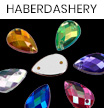




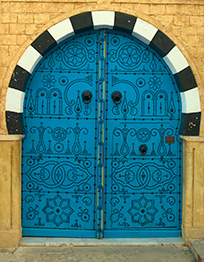

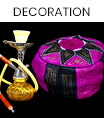



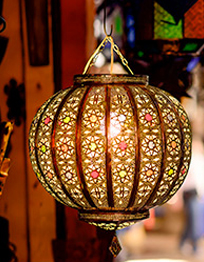


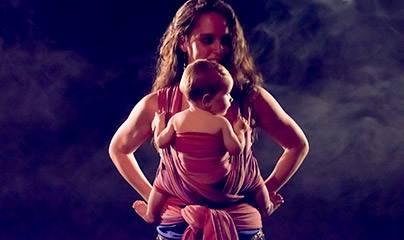

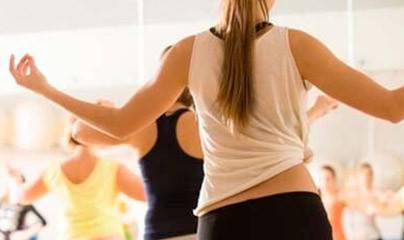

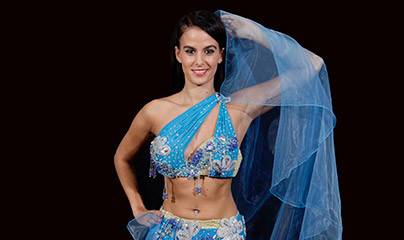

Leave a comment
Login to post comments